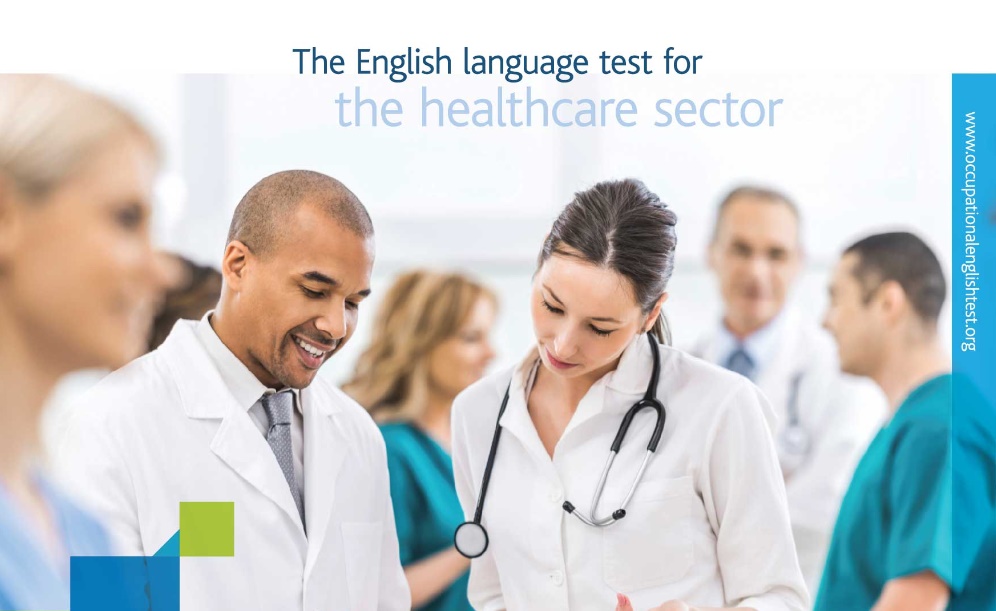An Introduction to OET

OET is an international English language test that assesses the language proficiency of healthcare professionals seeking to register and practise in an English-speaking environment.
OET tests health practitioners from the following 12 professions: dentistry, dietetics, medicine, nursing, occupational therapy, optometry, pharmacy, physiotherapy, podiatry, radiography, speech pathology, and veterinary science.
Why choose OET over other academic tests?
OET is now accepted by the Nursing and Midwifery Council (NMC), General Medical Council (GMC) and most recently the General Pharmaceutical Council in the UK as an alternative to the IELTS.
By taking OET you will prove you have the right level of English plus you’ll be learning the kind of language you will need every day at work. As the only English language test made specifically for the healthcare industry, it uses real healthcare scenarios – which can make you feel more confident than an academic English test.
Additionally, as OET replicates the types of communication skills you would need in a healthcare workplace, you’re developing as a professional while you learn.
- OET is widely recognised as proof of English proficiency for registration, study and work in the healthcare sector, as well as for visas in some countries. Click here for a list of organisations that recognise OET results as proof of English language proficiency
- OET is recommended by past test takers as the preparation and test materials help you develop language skills for success in your career – see stories about people like you.
Did you know...
Research indicates that the test is appropriate in content and difficulty for the healthcare workplace. A 2013 study by Cambridge English Language Assessment (Vidakovic & Khalifa, 2013) found that success at OET is a good indicator of workplace readiness in terms of language proficiency.
- 93% of health professionals agreed or strongly agreed that their employees and colleagues who have taken OET use English effectively in the health-related workplace. OET test takers found that the relevance to their professional contexts of test topics and content helped them engage more with the test preparation process, and made them feel confident about their ability to communicate effectively with patients, carers, and colleagues.
- In a 2013 study by the Language Testing Research Centre (LTRC) at the University of Melbourne (Macqueen, Pill, Elder, Knoch, 2013), OET test takers reported that the test tasks were highly relevant to workplace communication, and therefore taking OET had a beneficial impact in terms of acculturation as well as language proficiency. The research was conducted in Australia and noted that preparing for the test helped set their expectations of professional life and the workplace in the Australian context, and aspects of test content and tasks helped them participate more effectively when working in Australia.
- CBLA, in partnership with the LTRC and Cambridge Assessment English, is engaged in an ongoing programme of research and validation to ensure that OET continues to reflect the demands of communication in the workplace and that the test experience continues to have a positive impact on candidates and other stakeholders.
Frequently Asked Questions (FAQs)
What is the difference between OET and IELTS? Which is easier?
- The key difference for you as a health care worker, is that 100% of the OET exam topics, readings, roleplays, etc are from realistic healthcare contexts; IELTS is more General English with some academic English focus, too. The OET medical contexts should therefore both improve your confidence in the exam (you will be very familiar with the healthcare vocabulary and contexts), and also help you when you are back at work - our preparation course will give you feedback on your performance and English.
- We've written a blog post with a more detailed explanation of this here
Is this an exam you need to prepare for?
- The OET exam has quite specific formats for each paper, each of which will need quite specific exam strategies. We will raise your awareness of the different strategies to try to use, give you practice, reflection and feedback time for these. This will maximise your confidence and chances of success going into the exam.
I've watched online preparation materials and videos - how is an intensive course different?/Is a formal course necessary?
-
Online preparation videos and blogs are good and have a place in your own self study preparation. However, there is no interactive element, and therefore no chance for you to ask live questions, and no chance for you to have any feedback on your own individual progress, English weaknesses, and skill specific strategies. This is what you do get when you do our IH Bristol preparation course.
Is the course suitable for all 12 professions?
- No, the OET preparation course is authorised in the UK to prepare health care workers for nurses, midwives and doctors.
My healthcare profession isn't listed, is this is the exam/course for me?
- Our OET exam centre has exams for the various OET disciplines, but our preparation course is focused on nurses, midwives and doctors.
How long does an OET certificate last?
- You need to check with the relevant registered body in the UK (eg NMC or GMC). These typically state that OET qualifications are valid for two years.
I am not yet a qualified healthcare professional, will this course help me?
- No, this preparation course is for those already qualified in their own countries as healthcare professionals and is not a Medical English course. This preparation course is only for nurses, midwives and doctors.

